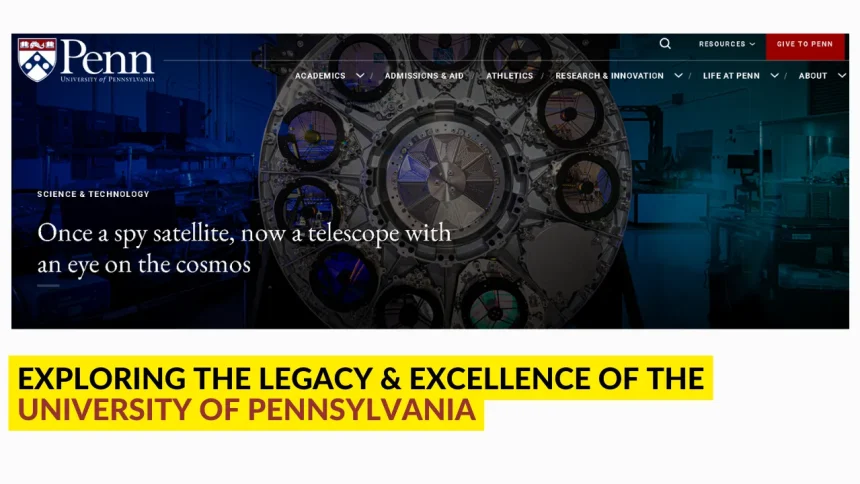
Introduction:
The University of Pennsylvania, commonly known as Penn, stands as an eminent institution that has shaped the landscape of education, research, and innovation for over two centuries. Nestled in the heart of Philadelphia, Pennsylvania, this Ivy League university has not only been a beacon of academic excellence but also a catalyst for societal change. This article delves deep into the rich history, academic prowess, research contributions, and the vibrant culture that defines the University of Pennsylvania.
I. Historical Overview:
Founded in 1740 by Benjamin Franklin, one of the Founding Fathers of the United States, the University of Pennsylvania has a storied past that reflects the spirit of American innovation and enlightenment. Originally established as the Academy of Philadelphia, Penn was envisioned by Franklin as an institution that would provide practical education to aspiring leaders of the American colonies.
Penn’s commitment to fostering a diverse and inclusive learning environment was evident from its early days. It was one of the first universities to admit students regardless of their religious affiliation, setting a precedent for an open-minded approach to education.
Over the years, Penn has evolved into a world-renowned institution with a global impact. Its history is intertwined with significant milestones in education, research, and societal progress, making it a venerable institution that continues to inspire generations.
II. Academic Excellence:
a. Undergraduate Programs:
The University of Pennsylvania offers a comprehensive array of undergraduate programs across various disciplines. With its commitment to interdisciplinary education, students have the flexibility to explore diverse fields of study, creating a well-rounded academic experience. From the renowned Wharton School of Business to the School of Arts and Sciences, Penn provides students with a rigorous curriculum and opportunities for hands-on learning.
b. Graduate and Professional Schools:
Penn’s graduate and professional schools are consistently ranked among the top in the world. The Perelman School of Medicine, Law School, School of Engineering and Applied Science, and the School of Design are just a few examples of the specialized schools that contribute to Penn’s reputation for academic excellence. The university’s commitment to cutting-edge research and innovation is reflected in the caliber of its graduate programs, attracting students and scholars from around the globe.
III. Research and Innovation:
a. Pioneering Research Centers:
Penn has been at the forefront of groundbreaking research across various disciplines. The university houses numerous research centers and institutes that focus on addressing complex global challenges. The Penn Institute for Urban Research, the Penn Wharton Public Policy Initiative, and the Penn Medicine Abramson Cancer Center are exemplary institutions that highlight the university’s commitment to advancing knowledge and making a tangible impact on society.
b. Interdisciplinary Collaboration:
One of Penn’s strengths lies in its emphasis on interdisciplinary collaboration. The Penn Integrates Knowledge (PIK) professorships bring together faculty from different disciplines to tackle multifaceted problems. This collaborative approach fosters innovation and ensures that research at Penn is not confined to traditional academic silos.
c. Entrepreneurship and Technology Transfer:
Penn has played a pivotal role in fostering an entrepreneurial ecosystem. The Penn Center for Innovation serves as a hub for technology transfer, helping researchers translate their discoveries into real-world applications. The university’s close ties with the business community and its location in Philadelphia, a city known for its thriving startup scene, contribute to a dynamic environment that encourages innovation and the commercialization of research.
IV. Campus and Facilities:
a. Architectural Marvels:
The University of Pennsylvania boasts a stunning campus that seamlessly blends historical architecture with modern facilities. Iconic structures like College Hall and the Fisher Fine Arts Library reflect the university’s commitment to preserving its rich heritage. The campus’s green spaces and state-of-the-art buildings create an inspiring environment for learning, research, and collaboration.
b. Pennovation Works:
In addition to its main campus, Penn has expanded its footprint with the development of Pennovation Works. This innovation hub brings together researchers, entrepreneurs, and industry leaders, providing a space for collaboration and the development of cutting-edge technologies. Pennovation Works exemplifies the university’s commitment to pushing the boundaries of knowledge and fostering a culture of innovation.
V. Global Engagement and Social Impact:
a. Global Initiatives:
Penn’s impact extends far beyond its Philadelphia campus, with a strong emphasis on global engagement. The university has established partnerships with institutions worldwide, fostering international collaborations in research, education, and social initiatives. Programs like the Penn Global Seminars and the Penn World Scholars facilitate cross-cultural exchanges, enriching the academic experience for students and scholars alike.
b. Social Responsibility:
The University of Pennsylvania is deeply committed to social responsibility and community engagement. Through initiatives like the Netter Center for Community Partnerships, Penn connects with local communities to address pressing social issues. Whether through educational outreach, healthcare initiatives, or economic development projects, Penn strives to make a positive impact and instill a sense of responsibility in its students.
VI. Student Life and Culture:
a. Vibrant Student Body:
Penn’s student body is known for its diversity, bringing together individuals with varied backgrounds, experiences, and perspectives. This diversity contributes to a vibrant and inclusive campus culture where students are encouraged to engage with one another, fostering a sense of community that extends beyond the classroom.
b. Extracurricular Activities:
The University of Pennsylvania offers a plethora of extracurricular activities, ranging from student-run clubs and organizations to cultural events and sports. The Penn Quakers compete in the Ivy League and NCAA Division I, providing students with the opportunity to participate in and support competitive athletics. Whether it’s through performing arts, community service, or leadership development, Penn encourages students to explore their interests beyond academics.
c. Arts and Culture:
Penn’s commitment to the arts is evident in its cultural offerings, including the Institute of Contemporary Art and the Annenberg Center for the Performing Arts. The university’s support for creative expression and artistic exploration enhances the overall student experience and contributes to the cultural vibrancy of both the campus and the city of Philadelphia.
VII. Alumni Impact:
The University of Pennsylvania boasts an impressive roster of alumni who have made significant contributions to various fields. From Nobel laureates and Pulitzer Prize winners to CEOs of multinational corporations, Penn’s graduates have excelled in diverse professions. Notable alumni include Donald Trump, Elon Musk, Andrea Mitchell, and Elizabeth Banks, among many others.
a. Alumni Networks:
Penn’s alumni network is a powerful resource for current students and recent graduates. The university facilitates connections through alumni events, mentorship programs, and networking opportunities, providing a bridge between academia and the professional world. The success and influence of Penn’s alumni underscore the enduring impact of a Penn education.
Conclusion:
The University of Pennsylvania stands as a testament to the enduring power of education to shape minds, drive innovation, and effect positive change. From its humble beginnings as an academy founded by Benjamin Franklin, Penn has evolved into a global institution at the forefront of research, education, and societal impact.
Its commitment to academic excellence, interdisciplinary collaboration, and social responsibility positions Penn as a leader in higher education, with a legacy that continues to inspire and shape the future. As the University of Pennsylvania moves forward, it remains dedicated to pushing boundaries, fostering innovation, and preparing the next generation of leaders to tackle the challenges of tomorrow.
